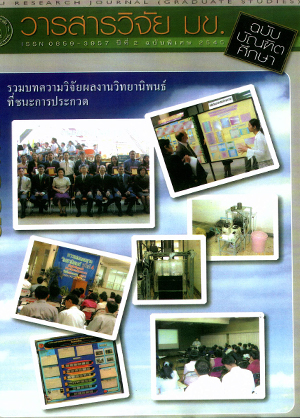Development of emotional Quotient Assessment Inventories Through Games Activities for early Childhood Students (การพัฒนาแบบประเมินเชาวน์อารมณ์ โดยใช้กิจกรรมเกมสำหรับนักเรียนระดับปฐมวัย)
Keywords:
Emotional Quotient Assessment InventoryAbstract
The purpose of the present study was to develop emotional quotient assessment inventories for early childhood students by relying on games as a medium for authentic performance assessment. The target group consisted of 63 kindergarten children (35 boys and 28 girls) in Khon Kean Universitys Demonstration School during the second semester of 2000 academic year, and again during the first semester of the 2001 academic year. The study took place in two separate stages as follows: The first stage, during the months of June and September of 2000, was the feasibility study for research and development of the present study. It was consisted of a study of general conditions of the target school, identifying the conceptual framework for the study, selection of emotional quotient constructs for assessment by early childhood experts and educational psychology scholars, analyses of the suitability of the games, a trial and selection of the games to be used as a medium for assessment. At this stage, a tentative hypothesis was formulated which stated that the games used as a medium of activities together with the emotional quotient assessment inventories as developed by the present researcher himself can assess 9 emotional quotient constructs of the early childhood students as prescribed in the present study. The second stage, the development of emotional quotient assessment inventories, took place during the months of November 2000 to July 2001. The activities at this stage included the organization of games and fixing of the first observation frame for the childrens behavior during the games for development of a prototype of behavioral checklists. In the process, 9 emotional quotient constructs were identified which included : 1) self-awareness; 2) trustworthiness; 3) discipline keeping ; 4) the capacity for waiting; 5) the capacity for fostering cordial relations with others; 6) appropriate expression of ones emotion; 7) the capacity to respond to the requirements of others; 8) the capacity to be a good leader as well as a good follower and 9) the capacity to entertain ones self and others. The games for assessment were minor games. They contained simple rules suitable for kindergarten-age children. These included 13 games of 1) the pushing-out game; 2) cloth-hiding game; 3) two-team relay race; 4) cattle breaking pen game; 5) throwing ball under legs game; 6) disorderly rushing game; 7) tiger-pack crossing a stream game; 8) tug-of-war; 9) musical chairs; 10) cockfighting game; 11) pig-tying game; 12) squirrel-tail catching game and 13) animal hunting game. After this first organization of games, a second organization of games was made in order to develop the behavioral checklists from the prototype ones. Following that, a third organization of games was made for the development of emotional quotient assessment inventories. The resulting inventories were subsequently examined for construct validity through the monotrait-heteromethod in which a childs behavior as displayed through an emotional quotient during a game was checked against his/her behavior under other circumstances, interviews with teachers and parents and checking the childs behavior by reviewing his/her class report on emotional and social development. When that was completed another check was made to ascertain the practicability of the inventories so developed. A manual for the use of the assessment inventories was also prepared. The results of the study was a complete set of emotional quotient assessment inventories to be used with the 13 games. As for construct validity, it was evident that there were congruences among a childs responding behavior in a game and behavior examined by heterogeneous methods. It was found that the games and the emotional quotient assessment inventories as developed, together can very clearly assess the early childhood students on 6 constructs and the games which can be used best with each of the constructs are as follows: The musical chairs for trustworthiness ; The pushing-out game for discipline keeping ; The two-team relay race for the capacity for waiting ; The cockfighting game for fostering cordial relations with others; The tiger-pack crossing a stream game for appropriate expression of ones emotion and The musical chairs the capacity to entertain ones self and others. The findings mentioned above were in agreement with the stated hypothesis. However, the three remaining emotional quotient constructs of self-awareness, the capacity to respond to the requirements of others and the capacity to be a good leader as well as a good follower could not be assessed clearly since none of the 13 games could utilized as a medium to display the childrens behavior explicitly with regard to these three emotional quotient constructs.
การศึกษาครั้งนี้มีวัตถุประสงค์เพื่อพัฒนาแบบประเมินเชาวน์อารมณ์ สำหรับ นักเรียนระดับปฐมวัย โดยใช้กิจกรรมเกมเป็นสื่อในการประเมินตามสถานการณ์จริง กลุ่ม เป้าหมายในการวิจัยคือ นักเรียนโรงเรียนสาธิต มหาวิทยาลัยขอนแก่น ระดับอนุบาล ภาคเรียนที่ 2 ปีการศึกษา 2543 และภาคเรียนที่ 1 ปีการศึกษา 2544 จำนวน 63 คน แบ่งเป็นชาย 35 คน หญิง 28 คน การดำเนินงานวิจัยและพัฒนาครั้งนี้แบ่งเป็น 2 ระยะ คือ ระยะที่ 1 การศึกษาความเป็นไปได้ในการวิจัยและพัฒนา ระหว่างเดือน มิถุนายน ถึง เดือน กันยายน 2543 ประกอบด้วย การศึกษาสภาพทั่วไปของโรงเรียนกลุ่มเป้าหมาย การกำหนดกรอบแนวคิดในการวิจัย การคัดเลือกคุณลักษณะเชาวน์อารมณ์ที่ใช้ในการประเมิน จากผู้เชี่ยวชาญด้านการศึกษาปฐมวัยและนักวิชาการด้านจิตวิทยาการศึกษา การวิเคราะห์ ความถูกต้องคุณลักษณะของเกมการทดลองจัดกิจกรรมเกมที่ใช้เป็นสื่อในการดำเนินงาน ประเมินและการคัดเลือกเกมที่ใช้ในการประเมิน ในการวิจัยครั้งนี้ ผู้วิจัยได้ตั้ง สมมติฐานชั่วคราวไว้ว่า เกมที่ใช้เป็นสื่อในการดำเนินกิจกรรมและแบบประเมินเชาวน์อารมณ์ ที่พัฒนาขึ้นสามารถประเมินคุณลักษณะเชาวน์อารมณ์ของเด็กนักเรียนระดับปฐมวัย ได้ จำนวน 9 คุณลักษณะ ตามที่ได้กำหนดไว้ในการศึกษาครั้งนี้ ระยะที่ 2 การดำเนินงานพัฒนาแบบประเมินเชาวน์อารมณ์ ระหว่างเดือนพฤศจิกายน 2543 ถึงเดือน กรกฎาคม 2544 ประกอบด้วย การจัดกิจกรรมเกมและกำหนดกรอบการสังเกต พฤติกรรมของเด็กขณะเล่นเกมครั้งแรก เพื่อพัฒนาต้นแบบของแบบสำรวจรายการพฤติกรรม ในการนี้ได้ศึกษาคุณลักษณะเชาวน์อารมณ์ 9 คุณลักษณะ คือ 1) ความสามารถในการตระหนัก และเข้าใจอารมณ์ตน 2) ความซื่อสัตย์เป็นที่ไว้วางใจ 3) การรักษาระเบียบวินัย 4) ความ สามารถในการรอคอย 5) ความสามารถในการสร้างสัมพันธภาพที่ดีกับบุคคลอื่น 6) การแสดง อารมณ์ต่อผู้อื่นได้อย่างเหมาะสม 7) การตอบสนองความต้องการของผู้อื่นได้ 8) ความเป็น ผู้นำผู้ตามที่ดี และ 9) ความสามารถในการสร้างความสนุกสนานให้เกิดแก่ตนเองและผู้อื่น สำหรับเกมที่ใช้เป็นสื่อในการประเมินคือ เกมรอง ซึ่งมีกฎและกติกาไม่สลับซับซ้อนนัก สำหรับเด็กปฐมวัย มีด้วยกันทั้งสิ้น จำนวน 13 เกม คือ 1) เกมผลักให้ออก 2) เกมมอญ ซ่อนผ้า 3) เกมวิ่งเปี้ยว 4) เกมวัวแหกคอก 5) เกมส่งลูกบอลลอดขา 6) เกมชุลมุน 7) เกมเสือข้ามห้วยหมู่ 8) เกมชักคะเย่อ 9) เกมเก้าอี้ดนตรี 10) เกมชนไก่ 11) เกมมัดหมู 12) เกมแย่งหางกระรอก และ 13) เกมนายพรานล่าสัตว์ หลังจากจัดกิจกรรม เกมครั้งแรกแล้ว ได้มีการจัดกิจกรรมเกมครั้งที่ 12 เพื่อพัฒนาแบบสำรวจรายการ พฤติกรรมจากต้นแบบ และได้มีการจัดกิจกรรมเกมครั้งที่ 3 เพื่อพัฒนาแบบประเมิน เชาวน์อารมณ์ และทำการตรวจสอบความตรงเชิงคุณลักษณะของแบบประเมินด้วยวิธีการ คุณลักษณะเดี่ยว-วิธีการหลาย โดยการตรวจสอบความสอดคล้องของพฤติกรรมของเด็กที่แสดง เชาวน์อารมณ์ 1 คุณลักษณะ ขณะร่วมกิจกรรมเกม กับการสังเกตพฤติกรรมเด็กในสถานการณ์ อื่น ๆ การสัมภาษณ์ครูผู้สอนและผู้ปกครองเด็กรวมทั้งการตรวจสอบพฤติกรรมจากเอกสาร บันทึกพัฒนาการของเด็กด้านอารมณ์และสังคม หลังจากนั้นได้ตรวจสอบความเป็นไปได้ในเชิง ปฏิบัติของการใช้แบบประเมิน และจัดทำคู่มือการใช้แบบประเมินเชาวน์อารมณ์ ผลจากการวิจัยและพัฒนา ทำให้ได้แบบประเมินเชาวน์อารมณ์สำหรับใช้ควบคู่กับการ จัดกิจกรรมเกม 13 ชุด ส่วนในการตรวจสอบความตรงเชิงคุณลักษณะนั้น ปรากฏว่ารูปแบบ พฤติกรรมของนักเรียนที่แสดงออกในการเล่นเกมมีความสอดคล้องกับพฤติกรรมที่ได้ตรวจสอบ โดยวิธีการอื่นที่หลากหลาย งานวิจัยนี้ ได้ค้นพบว่า เกมที่ใช้เป็นสื่อในการดำเนิน กิจกรรมและแบบประเมินเชาวน์อารมณ์ที่ได้พัฒนานี้ สามารถประเมินคุณลักษณะเชาวน์อารมณ์ ของเด็กปฐมวัยได้อย่างชัดเจน 6 คุณลักษณะ โดยมีเกมที่ใช้ได้ดีที่สุดในแต่ละคุณลักษณะ ดังนี้ คือ 1) ความซื่อสัตย์เป็นที่ไว้วางใจ ใช้เกมเก้าอี้ดนตรี 2) การรักษาระเบียบ วินัย ใช้เกมผลักให้ออก 3) ความสามารถในการรอคอย ใช้เกมวิ่งเปี้ยว 4) ความสามารถ ในการสร้างสัมพันธภาพที่ดีกับบุคคลอื่น ใช้เกมชนไก่ 5) การแสดงอารมณ์ต่อผู้อื่น ได้อย่างเหมาะสม ใช้เกมเสือข้ามห้วยหมู่ และ 6) ความสามารถในการสร้างความสนุกสนาน ให้เกิดแก่ตนเองและผู้อื่น ใช้เกมเก้าอี้ดนตรี ซึ่งการค้นพบนี้มีความสอดคล้องกับ สมมติฐานที่ตั้งไว้ ในส่วนของคุณลักษณะเชาวน์อารมณ์ 3 คุณลักษณะ คือ ความสามารถ ในการตระหนักและเข้าใจอารมณ์ตน การตอบสนองความต้องการของผู้อื่นได้ และความเป็น ผู้นำผู้ตามที่ดีนั้น ปรากฏว่าไม่เด่นชัดและเกมเหล่านี้ไม่สามารถดึงพฤติกรรมที่แสดง คุณลักษณะเชาวน์อารมณ์ออกมาได้ชัดเจน



